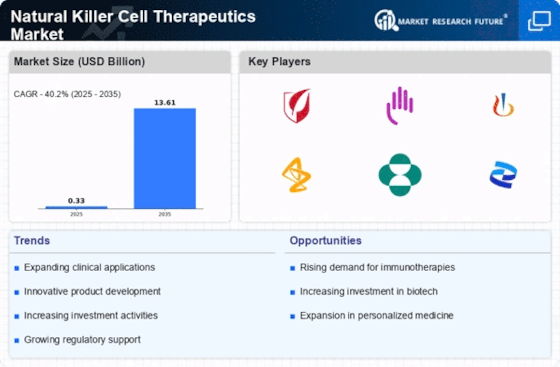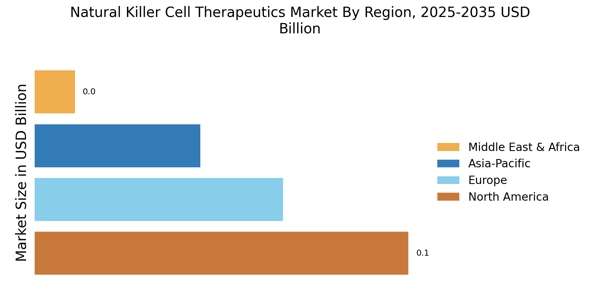Rising Incidence of Cancer
The increasing prevalence of cancer worldwide is a primary driver for the Natural Killer Cell Therapeutics Market. As cancer cases rise, the demand for innovative treatment options intensifies. Natural killer (NK) cells, known for their ability to target and destroy tumor cells, are gaining attention as a promising therapeutic approach. According to recent estimates, cancer cases are projected to reach over 29 million by 2040, highlighting the urgent need for effective therapies. This growing patient population is likely to propel investments in NK cell therapies, as healthcare providers seek to enhance treatment efficacy and improve patient outcomes. Consequently, the Natural Killer Cell Therapeutics Market is expected to experience substantial growth as stakeholders respond to this pressing healthcare challenge.
Supportive Regulatory Frameworks
Supportive regulatory frameworks are playing a crucial role in shaping the Natural Killer Cell Therapeutics Market. Regulatory agencies are increasingly streamlining the approval processes for cell-based therapies, facilitating faster access to innovative treatments for patients. Initiatives aimed at expediting the development and approval of NK cell therapies are likely to encourage investment and research in this area. For instance, the FDA has established programs to support the development of breakthrough therapies, which may include NK cell treatments. As regulatory environments become more favorable, the Natural Killer Cell Therapeutics Market is expected to witness accelerated growth, as companies are incentivized to bring their products to market more efficiently.
Increasing Collaborations and Partnerships
The trend of increasing collaborations and partnerships among biotechnology firms, academic institutions, and healthcare organizations is a notable driver for the Natural Killer Cell Therapeutics Market. These collaborations facilitate the sharing of knowledge, resources, and expertise, which can enhance the development of NK cell therapies. By pooling resources, stakeholders can accelerate research and clinical trials, ultimately leading to faster product development. The market is witnessing a surge in partnerships aimed at advancing NK cell research, with several high-profile collaborations announced in recent years. This collaborative spirit is likely to foster innovation and drive growth within the Natural Killer Cell Therapeutics Market, as stakeholders work together to address unmet medical needs.
Technological Advancements in Cell Therapy
Technological innovations in cell therapy are significantly influencing the Natural Killer Cell Therapeutics Market. Advances in genetic engineering, such as CRISPR and CAR technology, enable the enhancement of NK cell functions, improving their effectiveness against various malignancies. These technologies facilitate the development of personalized therapies, which are increasingly favored by patients and healthcare providers alike. The market for cell therapy is anticipated to reach approximately USD 20 billion by 2025, driven by these advancements. As research continues to evolve, the integration of cutting-edge technologies into NK cell therapies is likely to attract further investment and interest, thereby propelling the Natural Killer Cell Therapeutics Market forward.
Growing Awareness and Acceptance of Immunotherapy
The rising awareness and acceptance of immunotherapy as a viable treatment option is a significant driver for the Natural Killer Cell Therapeutics Market. Patients and healthcare professionals are increasingly recognizing the potential of immunotherapeutic approaches, including NK cell therapies, to provide effective treatment alternatives. This shift in perception is supported by a growing body of clinical evidence demonstrating the efficacy of NK cell therapies in treating various cancers. As more patients seek out these innovative treatments, the market is expected to expand. The Natural Killer Cell Therapeutics Market is likely to benefit from this trend, as healthcare systems adapt to incorporate immunotherapy into standard treatment protocols.

















